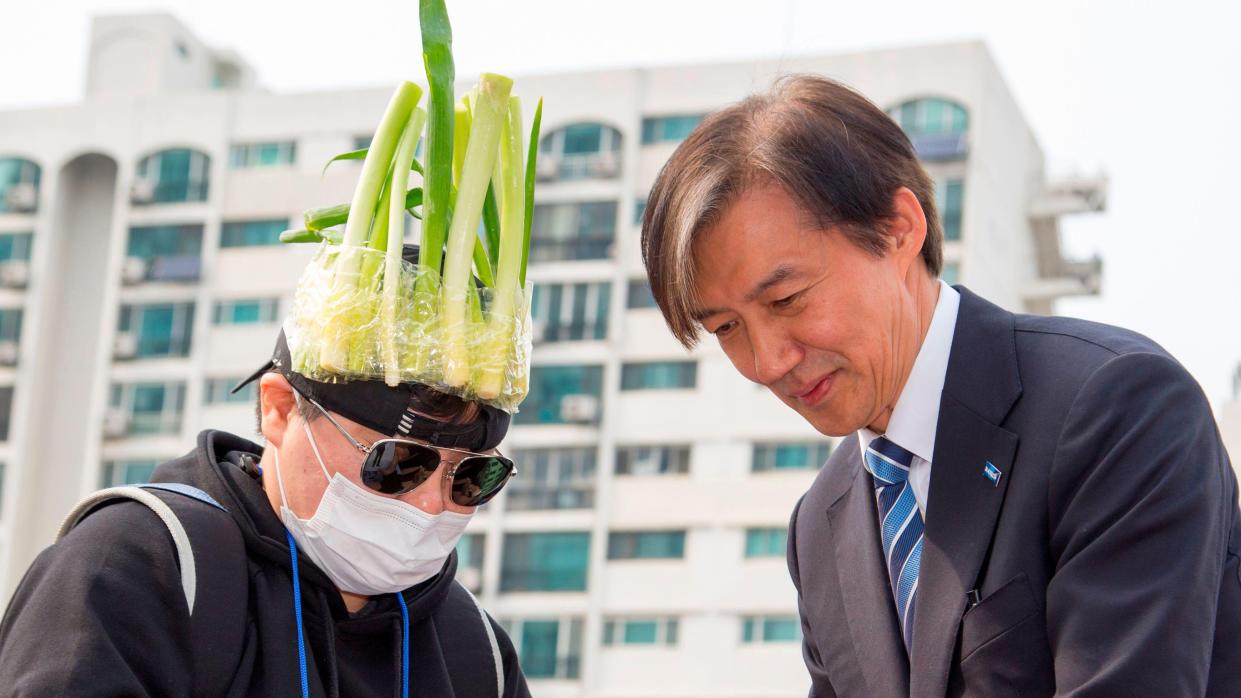How green onions could swing South Korea's election

Yoon Suk Yeol is "hardly the first" politician to appear out of touch with ordinary voters amid a cost-of-living crisis – but in the run-up to South Korea's key national elections this week, the country's conservative president found himself "tripped up by a humble vegetable".
As South Koreans headed to the polls to elect their new 300-member parliament, green onions have "gone from a simple staple of Korean cooking to a powerful symbol of voter anger over rising prices in Asia's fourth-biggest economy", said The Guardian.
What did the president say about green onions?
The furore over green onions started after President Yoon Suk Yeol visited a supermarket in Seoul last month, in a bid to "promote government efforts to tame food prices", said the Associated Press (AP). But Yoon came under criticism after commenting on the price of green onions, a staple food in the country.
Looking at a bundle of green onions on display, Yoon said he had been to many supermarkets and the store's price of 875 won (£0.51) seemed to be a "reasonable price".
However, observers quickly pointed out that the price was a temporary discount price thanks to government subsidies. The average retail price for green onions is currently around 3,000 won to 4,000 won (£1.75 to £2.33), some of the highest prices in recent years.
Yoon's People Power party is looking to take control of South Korea's assembly from a liberal majority led by the opposition Democratic party, but his ill-fated trip to the supermarket has "added to criticism that Yoon appears aloof", said The Guardian.
With food price inflation a key voter concern, the incident has "fuelled a surge in support" for smaller parties that could "upset the balance of power and render Yoon a lame-duck leader just two years into his presidency", said the paper.
What has the backlash looked like?
Opposition candidates have since brandished green onions at campaign rallies, using the incident as proof that the 63-year-old president was out of touch with the average person.
Social media has been "awash" with onion memes, with some users even posting photographs of green onions outside polling stations after the National Election Commission banned the vegetable from voting sites, citing concerns over "electoral interference".
"While people's expression of political views should be respected to the maximum level, using a certain item as a means of expression other than for their original purpose has great potential to affect the election," said the commission.
The ban "set off a fresh rush to find green onion-themed memorabilia" to take to polling stations, according to AFP. "I wasn't initially thinking about the green onion issue, but after I heard about the ban, I bought a green onion hairband and I'm determined to wear it on election day," said one voter speaking to AFP at the weekend.
What are the key issues in this year's election?
Domestic issues such as employment rates and food prices were key election issues this year, with more traditional topics – such as North Korea's nuclear threat and the US commitment to maintaining security in the region – taking a less prominent position in the national conversation.
This is in part due to South Korea's "stark" conservative-liberal divide, with many voters likely to have "already determined who they'll vote for according to their party affiliation, rather than by looking at the policies of the candidates in their districts", said AP.
But this "extreme polarisation" has led to a larger pool of "moderate voters" who eschew partisan politics and instead want to focus on domestic issues such as taxes, inflation and jobs.
"In a nutshell, even if conservatives and liberals intensely bicker over political issues, that won't influence election results much," said Choi Jin, director of the Seoul-based Institute of Presidential Leadership, speaking to AP.
"The fate of an election is rather determined by the moderates who silently monitor livelihood issues and decide who to vote for."
What next?
Some 44 million people headed to the polls, with polling stations open at 6am for 12 hours, and vote counting is now under way.
With many moderate voters undecided, it has been difficult to determine a likely electoral outcome. But in a Gallup survey on 31 March, reported The Guardian, the opposition Democratic party, led by Lee Jae-myung, was polling slightly ahead of Yoon's party, by 37% to 35%.


